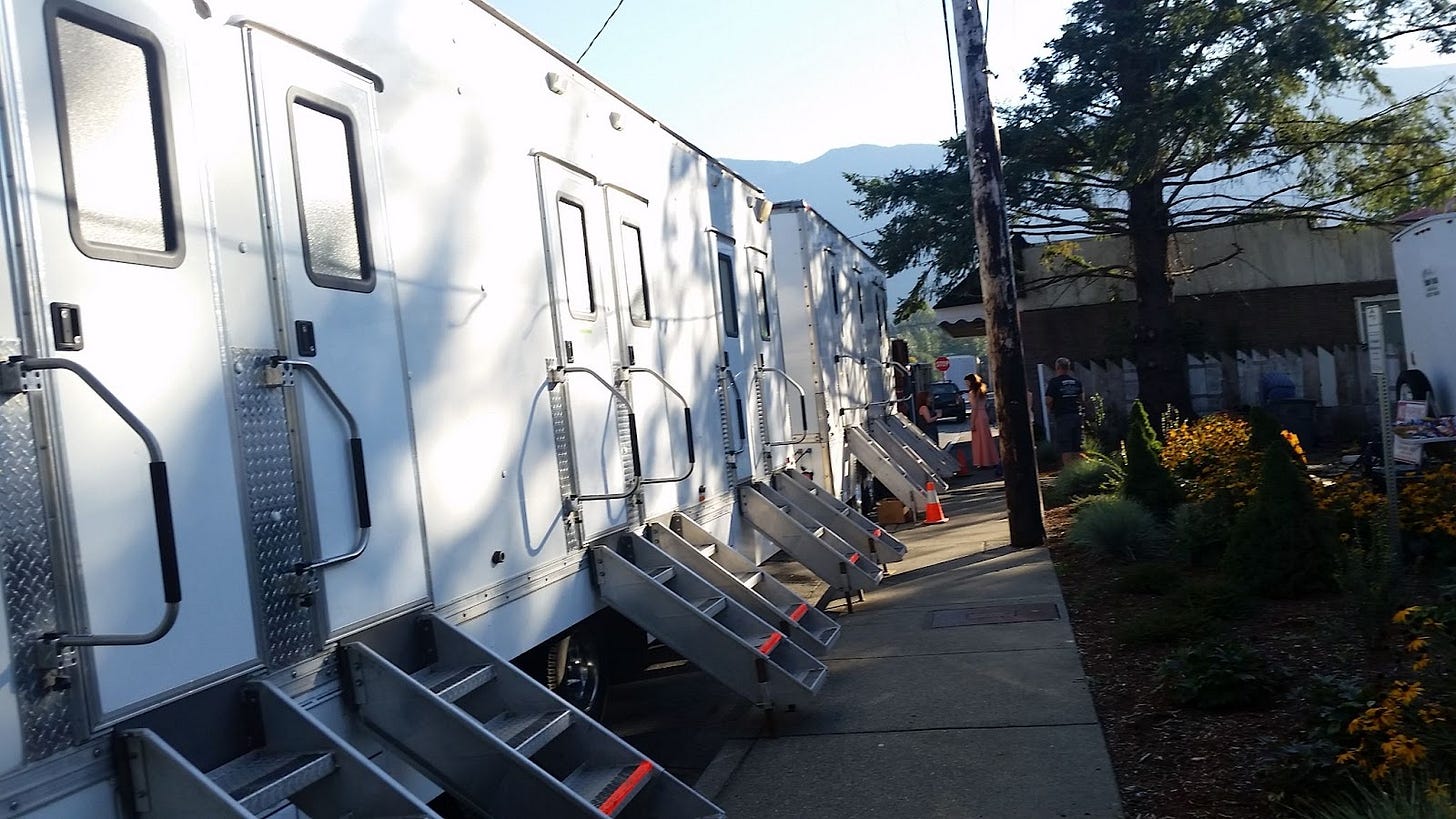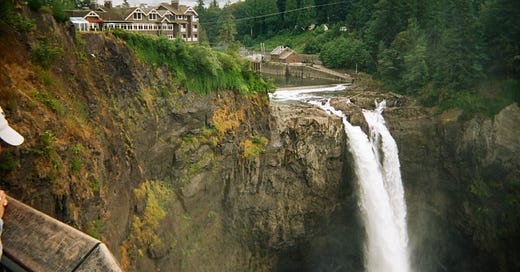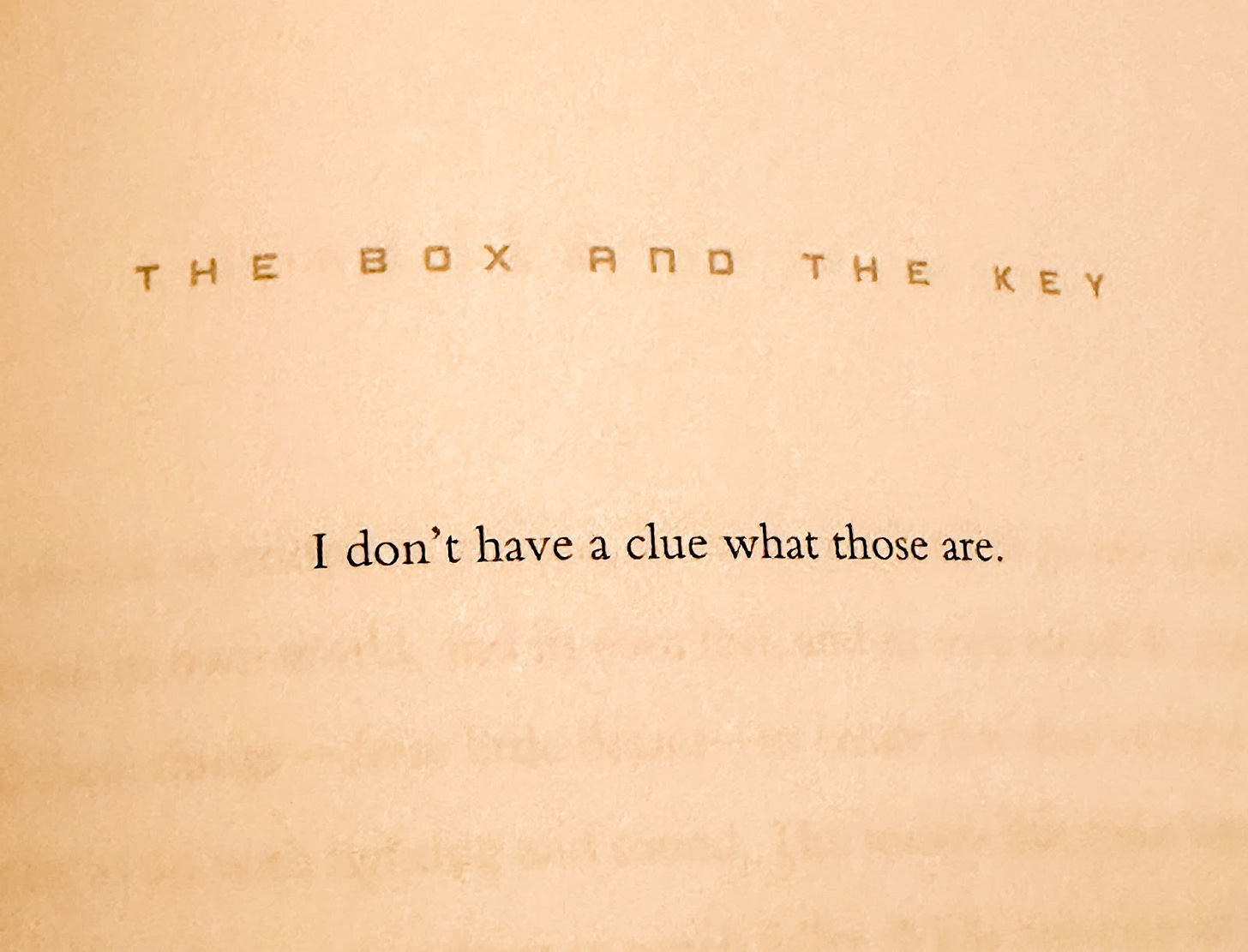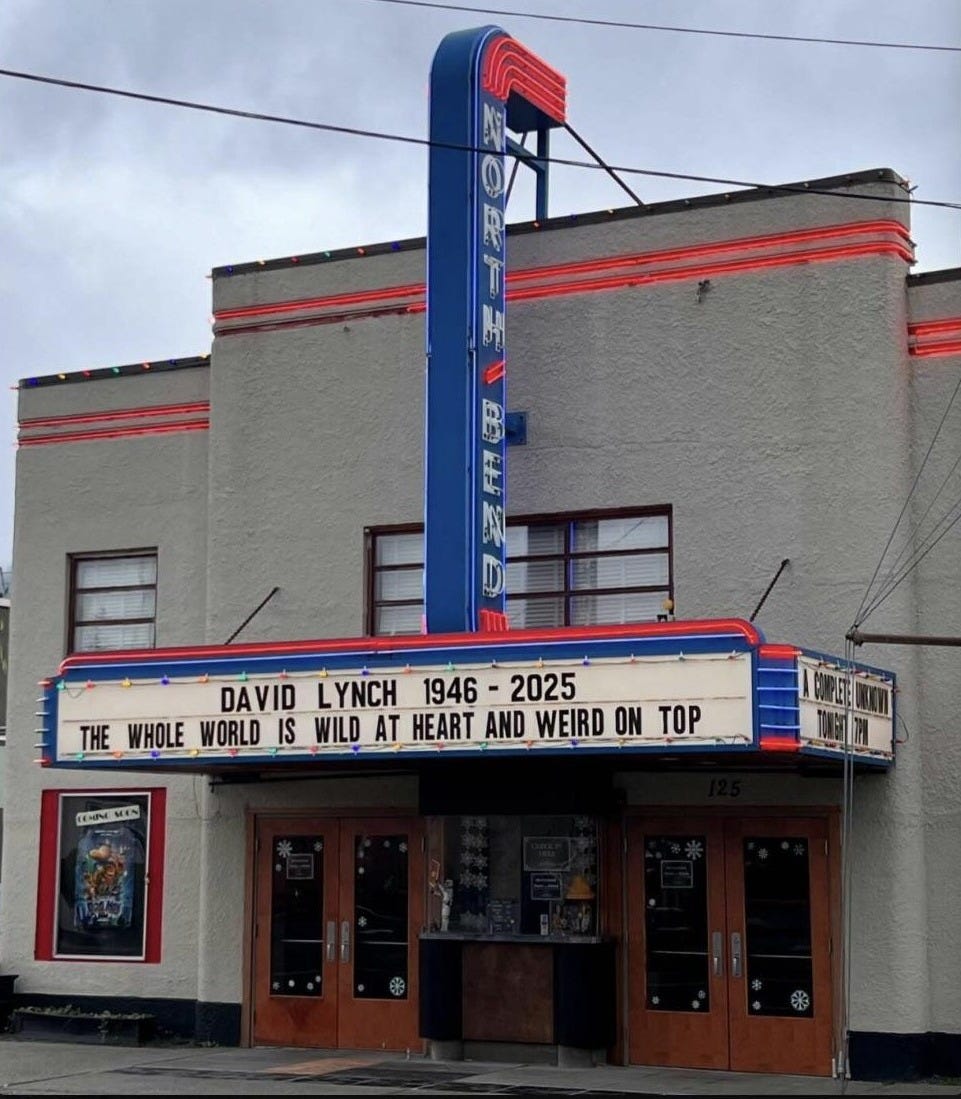I still kind of can’t believe I’m writing this. I know that the man, David Lynch, was 78 years old. But he’s one of those people that’s so monumental, so important, you figure that he must have transcended the limits of his corporeal form long ago. Of course, this never turns out to be true. Part of what made David Lynch so remarkable is, I think, that he was just a guy. But god, what a guy.
If you’re expecting theory and analysis from me this time, I’m sorry to disappoint. This is an overlong personal eulogy. You’ll see why.
David Lynch did not know me, but I can’t remember a time when I didn’t know him.
It was 1992, Twin Peaks: Fire Walk With Me was still in theaters. It had made its North American premiere, at Lynch’s insistence, in North Bend, WA, the real-life Twin Peaks. The cast and some crew descended on the small town and stayed in the nearby Salish Lodge in Snoqualmie, a hotel and resort that played the exterior of the Great Northern Lodge in the show. The Salish Lodge also happened to be where my dad was a sommelier at the time. The night of the premiere, there was a big, private dinner at the Salish for Lynch and the cast, which my dad worked. At the time, Twin Peaks was my dad’s favorite show. David Lynch has probably always remained his favorite director. To get the straight story, I called up my dad to ask him what he remembers of that dinner:
“They held the premiere in North Bend, the community had done so much for the film so I guess it was fitting. The cast had been staying at the lodge for a few days, I met the dad, Leland, and I met the Log Lady. Super nice, totally normal people. I was a huge fan boy, but of course your job is to treat them like any other guest. I had already served a bunch of famous people, so you kinda got used to it.
After the premiere the cast and David Lynch came back to the lodge and we kept the dining room open late for them and put them in a private section, there was about ten to twelve of them. I think Kyle McLachlan was there, but I was too focused on David Lynch. I just remember thinking “that’s David fucking Lynch, how cool is this?”
But I treated him like any other customer. They were passing around the wine list and eventually it landed with David, like he was the boss, he was in charge of the decisions. So I went up and introduced myself. There was a joke I liked to make because our wine list was this massive, 27-page thing, so I said “I see you’ve been browsing our wine encyclopedia there” and asked if he needed help choosing one, or pairing some with his meal, etc. I played it very cool, I think the most I said to him about his work was “congratulations on the premiere, welcome back.” Then we just talked about the wine list. I remember he was so happy, he was just smiling and happy and really in a good mood, it seemed. He was so nice, super nice, very polite. Not snobby at all, not like “oh I’m a directing god” like you’d expect some hollywood people to be. He couldn’t have been nicer, easy to talk to, super approachable.
I always felt comfortable talking to anyone about the wine list because that was my comfort zone, even though I knew exactly who he was and was kind of awe struck, I mean he created one of my favorite shows ever.
Once we decided on a couple wines he said great, that sounds great. I said “be back in a minute,” I opened them up and he tasted them. He said “yeah these are great” and I poured for the table. They were there for a couple more hours, and then that was it. Never saw them again.”
We moved to other subjects, he told me about serving Bob Hope who asked if they had any wines from Virginia like he had drank with Jimmy Carter at the White House, but then he remembered a last anecdote.
“Oh, one more thing. I might be embellishing, but I think I remember toward the end of the meal he lit up a cigar.”
“Not a cigarette?” I asked.
“No, a cigar.” he said. “He was celebrating.”
“And the whole staff was kind of like “what do we do? do we say something?” and eventually someone did go up to him and asked him very very politely if he wouldn’t mind smoking outside. We had an outdoor patio like 20 feet away. He was like “oh yeah, no problem, so sorry.”
I just remember him being so nice, and so happy, and so just…in a really good positive mood. I think he was just happy that it was done and got released. He was just happy.”
I was born not far from there about 3 weeks later.
Growing up I always heard about David Lynch and Twin Peaks, but I could never watch it. It was this mysterious, off-limits thing. As a kid my grandma told me a story about going to see a David Lynch movie with my mom and my dad.
“We went to see this David Lynch movie in theaters, Blue Velvet, because your dad was such a big fan of him. And I just remember there’s this long scene of someone vomiting in a hotel room, and that’s it. It was so awful, I hated it. Afterward I told your Dad I’m never seeing a David Lynch movie with him again.”
She told the story with biting horror, bordering on disgust. I was confused when I later watched Blue Velvet, braced for this scene that did not come to pass. In retrospect I believe she was thinking of Laura Dern’s vomit in Wild At Heart.
I was raised in the suburbs, so I didn’t even properly get into Lynch in my teen years. I wasn’t cool enough yet, I wasn’t ready. My dad’s vocal love of David Lynch somehow did not immediately translate to me having cool and perfect taste until well into adulthood.
The first David Lynch movie I properly watched in its entirety was Mulholland Drive. In my early twenties I was in my mom’s basement with my friend Kory, and Mulholland Drive was on Netflix. We started the film and watched in complete silence until Lynch took us behind Winkie’s diner. We screamed. I scrambled for the remote and turned the TV off as if it had transformed into a fly that needed to be desperately swatted. We were terrified, bug-eyed, out of breath like we’d just been chased for miles. “What the fuck was that?” we both asked. We had never seen anything like it. Growing up in the 2000’s I had been mostly exposed to shitty schlock-horror, movies that we would go see in theaters as teenagers, an excuse to make out with girls in the dark. What we were now being confronted with was something immense, dark, and much more meaningful than a cheap jump scare. It shot right into my spine and embedded itself into me with the force of a fresh addiction. We gulped, determined to finish the movie.
When it ended Kory again asked me, “what the fuck was that?” We were still immature cinephiles, raised on Reddit and Chris Nolan movies. We still had the fixed blinders of viewing movies as a puzzle to be solved. What was the deal with the box and the key? What was the correct way to fit all these puzzle pieces together? We famously weren’t the only ones to ask this, but I eventually learned that seeking these answers was fruitless. You have to let this kind of art wash over you. Give yourself over to it, and you will be rewarded.
After high school, I briefly attended a local community college to study film. From there I got my first PA gig, so I stopped going to school and started working on set. You heard a lot about David Lynch and the legacy of Twin Peaks working in the Seattle film industry, in a way it drove us. Everyone could see how much Lynch loved, admired, and lifted up our little corner of the world, having even grown up in Spokane for a time himself. He loved us and we loved him back. We all yearned to be close to his work in one small way or another.
Oh Diane, I almost forgot. Got to find out what kind of trees these are. They’re really something. - Dale Cooper, Twin Peaks Pilot
This desire took on a much greater importance in 2015, when we caught wind that a new season of Twin Peaks was going to be filming in and around Snoqualmie and North Bend under the codename Rancho Rosa. By that time I’d seen Twin Peaks and developed a warm appreciation for Lynch that would only continue to grow. I was not alone in this appreciation, everyone scrambled to land a spot as a crew member on the production.
The thing about working in a very small local film industry is that it amplifies the nepotism and gatekeeping that run rampant in the industry. In a state with exactly one DGA (Directors Guild of America) Assistant Director, good luck ever getting into the union. If someone decides they don’t like you, and they’re one vector through which all film in your region happens, your career is over. This is a wall I unfortunately ran headfirst into trying to get a crew position on The Return. In short, I had made a bad impression on the Production Coordinator when I had worked with her on my first “big” (~$1 million) movie two years earlier. Even on that set I had turned around my reputation by the end of the shoot, but it wasn’t enough for some people. When I heard who the Production Coordinator was on Rancho Rosa, my heart sank. I begged friends, I left voicemails with the UPM explaining that I had grown enormously as a crew member, but it was in vain. I fell into a depression, then I got the casting call email.
As my dad found himself meeting David Lynch just before I would be born, I found myself on set with David Lynch just before my twenty-third birthday. I had been an extra and a stand-in before, it’s actually how I started on set before I became a PA. One of my connections had finally come through for me. It was an overnight shoot at Twede’s Cafe, the RR, in North Bend. I arrived at the parking lot and waited for the white van that would bring us to base camp, upon boarding which I almost fell into the lap of my friend Kate, who had recently moved to LA. Turns out she had flown back overnight when her agent told her what she had got the part in.
After we got to basecamp we were being put through wardrobe, extras rarely went through hair and makeup unless it was a period piece or they were in closeups. I had worn the standard pacific northwest uniform of jeans, a flannel, and I think a vest. The costumer didn’t change a thing. As I stepped out of the costume trailer I again ran almost-directly into Kate, although now she was adorned in the iconic robins egg blue uniform of a RR waitress. We looked at each other. “Oh my god” I said. “I know,” she said.

We’re then whisked to extras holding which was in the upper level of the North Bend theater, where Fire Walk With Me had premiered 23 years earlier. Kate was taken for rehearsal, I waited. Three to four hours passed before Kate returned in a daze. I said something like “what took you?” and she replied, as if very far away, “We just…worked on the scene. We just kept working on it and changing it. It’s a totally different scene than it was, it’s much better.” I asked what he was like and she immediately went “amazing. He makes you feel comfortable and part of the process. He was so kind and patient and…empowering. I’ve never seen anything like it.”
A four hour rehearsal for one scene told me that we were working on something where Lynch was in full control, he could do whatever he wanted. Everyone was fully given over to his vision, everyone trusted him. I remember thinking how grateful I was that a network had given him basically unlimited money to light on fire. Because rehearsal ran so long, we made it to lunch before shooting anything. Lunch was also twice as long as usual to allow David time for meditation.
After lunch, around midnight, I was brought to set by a PA named Riley, who someone later informed me was David Lynch’s son. He was very nice, kind and aloof. I was positioned directly outside of the RR—on the left side of the door—outside of the view of the camera, I would be signaled when to walk through the frame. We were shooting a scene where Norma was being persuaded to try and franchise the RR. The actor playing the business exec stood in front of me, and would enter and re-enter the door with every take. Everett McGil was also standing in front of me for a time, he’s very tall.

Unfortunately, my cue never came. I didn’t get placed in the diner, and you can’t see me walk past the window. I’m not sure how I was able to walk around set, but I was. I found myself talking to my friend who was a PA on the show. They were filming a scene with Peggy Lipton and Everett McGil, Norma and Ed. Lynch’s video village is setup outside the diner and he’s directing Peggy over the walkie. My friend goes “you wanna hear something?” He hands me his earpiece. I put it in my ear, they had just done a take. I hear Peggy go “was that good, David?” And David goes “Oh yeah, baby. That was beautiful. Let’s do it again and don’t you change a thing.”
Five years later, we’re in lockdown. I had moved to New York, but I had flown home as lockdowns began. Seattle was the original epicenter, for those who don’t remember. I was enrolled at The New School and my classes had gone online. My partner at the time and I bunked together at my moms small place in Seattle, my brother joined us from LA, as did a great dane puppy a few months later. David Lynch started his weather reports in May of 2020 and immediately became part of an early morning ritual for me. My partner and I would wake up very early in time for me to join my virtual classes on east coast time. She would more often than not cook breakfast, she was an angel and I’m so glad she’s still my best friend. I would set up my computer and get camera-presentable. While we were getting ready, we would put David Lynch’s latest weather report and number of the day on the TV. I felt really lucky to be let into a slice of his routine, which in turn inspired routine in me.
When fall semester came around I enrolled in a course simply titled David Lynch. It was maybe my favorite course I ever took, and the rare online course perfectly suited to the medium. It essentially amounted to a film club with homework. Each week we would watch a different work of Lynch’s in chronological order, accompanied by a chapter of Todd McGowan’s The Impossible David Lynch or Lynch and/or Kristin McKenna’s (auto)biography Room to Dream. We were asked to keep a dream journal, to keep an eye out for “quotidian objects” in our surroundings that we could eventually do a project on. This all culminated in a final essay, which I wrote on Denise Bryson. For that year, between the morning weather reports and my studies, David Lynch was the biggest constant in my life.
The day David Lynch died hit me harder than I ever expected. I cried for a solid hour. I received messages from friends as if a family member had died, it felt like one had. My friend Lio from Washington called me, we were both already crying. They told me a nice story.
They had lived in North Bend for awhile as a kid, and as a shithead sixteen year old had worked at the North Bend theater. One day they were smoking weed in the projection booth—which was usually fine because the Cool Manager was often working—and the Less Cool manager walks in. Lio coughs, throws their piece under a table, and sprays the air with a Bath & Body Works aerosol. “Oh hey, I thought the other manager was working today” they said. “No” replied the manager “Lio, this is David Lynch” and he stepped aside to welcome David into the cramped, hot-boxed projection booth. Lio fumbled a bit through telling him what an impact his work had had on them, and he goes “SO YOU PROJECT FILM HERE? THAT’S A VERY IMPORTANT SKILL. PRACTICE THAT. IT’S A DYING ART, YOU KNOW.” Lio said they know, and that he was enthralled by their film projection setup. He thanked them for their time, and left.
There are a lot more stories. There are always more stories.
When my mom had hip surgery I flew home for it, it was in Snoqualmie, during those three nerve-racking hours I found comfort in pie at Twede’s.
I knew one of the costumers who worked on the pilot of Twin Peaks who was later brought onto Blue Velvet and told me the story of thrifting the dress Laura Dern wears during her entrance in Blue Velvet.
I have two Twin Peaks tattoos.
I was Henry from Eraserhead two years ago for halloween.
The guy who sweeps the floor of the Bang Bang Bar for the entire end credits of an episode of The Return is a dolly grip named Willie who I worked with many times and taught me some harsh but valuable lessons when I was just starting out.
I grew up in Everett, 10 minutes from Laura Palmer’s house.
For my birthday this year, as a present to me, one of my best friends secretly watched all of Twin Peaks, FWWM, and The Return so we could talk about it. When I was home for Christmas we visited the above mentioned Palmer house.
The list goes on.
What this all comes down to is not that I have some unique special connection to David Lynch, but that my story is one in a sea of similar stories. In tapping into America’s collective unconscious with such visceral force he became a living and vital part of it. We see and hear him in the hum of an electrical socket, the flickering of a faulty lightbulb, the flame licking the cigarette, the dark saccharine void in the cup of coffee. He was such a potent psychic force for good in our world that this was already true prior to him leaving us, which has now only been amplified ten fold. He was the transparent glue in the cracks of America, holding us together in revealing what’s wrong so that it can be fixed.
Things are fundamentally, irreversibly different now. I simultaneously don’t know what to do and am filled with a resolve to fill the gaping artistic vacuum left by Lynch. It feels deeply urgent to me. We live in a time where art is being destroyed, depressed, de-incentivized. It is virtually impossible for someone like David Lynch to emerge in our contemporary media landscape, and this is by design. I feel resolved to throw irony in the bin and light the bin on fire. I feel resolved to move through the coming hardship with love, sincerity, and ferocity. None of us will ever be able to replace David Lynch, but maybe enough of us can take lessons from the way he lived his life that we can wrangle a new generation of transcendental artists out of the wreckage of our postmodern era.
You just stay alert, do your work, don't worry about the world going by. It doesn't mean that you can sit around and not do anything. You've got to get your butt in gear and do it. And don't take no for an answer, translate those ideas to cinema or to a painting or to whatever and figure out a way to get it done. - David Lynch
There is a pit in my stomach at the idea that we no longer have a guide through the void, a light to make sense of the dark. If we do not make our own way, we risk falling into oblivion. This, I think, is what it means to honor his legacy. Not to merely imitate what we love about him and his work, but to be unflinching in our love for people and our determination to urge better of them through art. To go beyond urging and make this world. We have the gift of blueprints, now we’ve got a lot of work to do.







